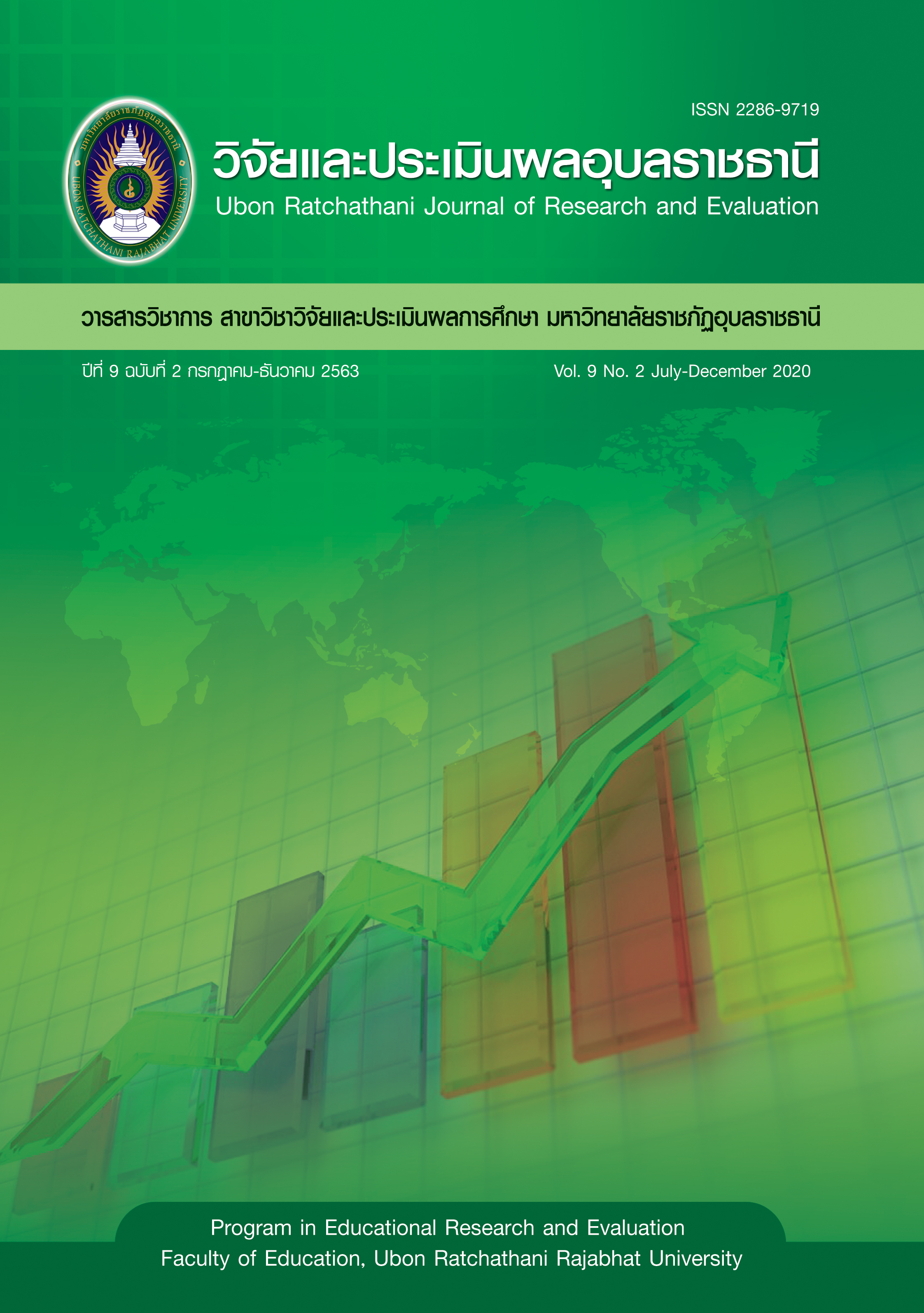ปัจจัยที่ส่งผลต่อเกรดเฉลี่ยสะสมของนักศึกษาครู
คำสำคัญ:
นักศึกษาครู, เกรดเฉลี่ยสะสม, การวิเคราะห์การถดถอยพหุคูณบทคัดย่อ
การวิจัยครั้งนี้มีวัตถุประสงค์ 1) เพื่อศึกษาความสัมพันธ์ระหว่างตัวแปรปัจจัยกับเกรดเฉลี่ยสะสมของนักศึกษาครู 2) เพื่อค้นหาปัจจัยที่ส่งผลต่อเกรดเฉลี่ยสะสมของนักศึกษาครู และ 3) เพื่อสร้างสมการพยากรณ์เกรดเฉลี่ยสะสมของนักศึกษาครู ดำเนินการเก็บรวบรวมข้อมูลในปีการศึกษา 2562 จากนักศึกษาคณะครุศาสตร์ มหาวิทยาลัยราชภัฏในภาคตะวันออกเฉียงเหนือ ชั้นปีที่ 4 จำนวน 600 คน ที่ได้มาโดยการสุ่มแบบสองขั้นตอน เก็บรวบรวมข้อมูลโดยใช้แบบสอบถามที่ผ่านการตรวจสอบความเที่ยงตรงเชิงเนื้อหาโดยผู้เชี่ยวชาญ วิเคราะห์ข้อมูลด้วยโปรแกรม R แพ็กเกจ jmv โดยหาค่าเฉลี่ย ส่วนเบี่ยงเบนมาตรฐาน สัมประสิทธิ์สหสัมพันธ์ระหว่างตัวแปร และการวิเคราะห์การถดถอยพหุคูณ
ผลการวิจัยพบว่า
- สัมประสิทธิ์สหสัมพันธ์ภายในตัวแปรปัจจัย และตัวแปรปัจจัยกับเกรดเฉลี่ยสะสมของนักศึกษาครู
มีความสัมพันธ์ทางบวก - ตัวแปรที่มีน้ำหนักความสำคัญต่อเกรดเฉลี่ยสะสมของนักศึกษาครู คือ เกรดเฉลี่ยสะสมระดับมัธยมศึกษาตอนปลาย ความฉลาดทางอารมณ์ การมีวินัยในตนเอง และเจตคติต่อวิชาชีพครู และปัจจัยเหล่านี้สามารถร่วมกันอธิบายความแปรปรวนเกรดเฉลี่ยสะสมของนักศึกษาครูได้ร้อยละ 77.25
- สามารถเขียนเป็นสมการพยากรณ์ในรูปคะแนนดิบและคะแนนมาตรฐานได้ตามลำดับดังนี้
= -0.362 + 0.731X1 + 0.106X2 + 0.098X3 + 0.074X4
Z = 0.678ZX1 + 0.132ZX2 + 0.126ZX3 + 0.094ZX4
เอกสารอ้างอิง
จันทิมา ขนายกลาง. (2541). ปัจจัยที่ส่งผลต่อผลสัมฤทธิ์ทางการเรียนวิชาคอมพิวเตอร์ของนักศึกษา โปรแกรมวิชาคอมพิวเตอร์ศึกษาระดับปริญญาตรีในสถาบันราชภัฏ (วิทยานิพนธ์ครุศาสตรมหาบัณฑิต สาขาวิชา
โสตทัศนศึกษา). จุฬาลงกรณ์มหาวิทยาลัย, กรุงเทพฯ.
Khanayklang, J. (1998). Factors affecting computer learning achievement of computer education program students at the under graduate level in Rajabhat Institutes (Master of Education thesis, program in Education in Audio-Visual Communications). Chulalongkorn University, Bangkok. [in Thai].
ทศพร ประเสริฐสุข. (2542). ความเฉลียวฉลาดทางอารมณ์กับการศึกษา. วารสารพฤติกรรมศาสตร์, 5(1), 19-36.
Prasertsuk, T. (1999): Emotional Intelligence and Education. Journal of Behavioral Science, 5(1), 19-36. [in Thai].
รุจิราพรรณ คงช่วย. (2557). รูปแบบความสัมพันธ์เชิงสาเหตุของปัจจัยที่มีอิทธิพลต่อผลสัมฤทธิ์ทางการเรียนของนักศึกษาคณะครุศาสตร์ มหาวิทยาลัยราชภัฏเขตภาคใต้ (รายงานการวิจัย). สงขลา: คณะครุศาสตร์มหาวิทยาลัยราชภัฏสงขลา.
Kongchuay, R. (2013). The Causal Relationship Model of Factors Influencing Achievement of Students, Faculty of Education, Rajabhat Universities in Southern Regional Area (Research report). Songkhla: Faculty of Education, Songkhla Rajabhat University. [in Thai].
ลินดา นาคโปย. (2555). ปัจจัยเชิงสาเหตุพหุระดับที่ส่งผลต่อคุณลักษณะที่พึงประสงค์ของนักศึกษาครู
คณะครุศาสตร์ ศึกษาศาสตร์ (ดุษฎีนิพนธ์ปรัชญาดุษฎีบัณฑิต สาขาวิชาวิจัย วัดผล และสถิติการศึกษา). มหาวิทยาลัยบูรพา, ชลบุรี.
Narkpoy, L. (2011). The multi-level causal factors affect on desirable performing characteristics of student in the faculty of education's (Doctoral dissertation, program in Educational Research, Measurement and Statistics). Burapha University, Chonburi. [in Thai].
วรางคณา เรียนสุทธิ์, (2560). ตัวแบบพยากรณ์เกรดเฉลี่ยสะสมของนิสิตระดับปริญญาตรี มหาวิทยาลัยทักษิณ.วารสารมหาวิทยาลัยทักษิณ, 20(1), 88-96.
Riansuti, W. (2017). Factors Influencing on Grade Point Average of Thaksin University’s Undergraduate Students. Thaksin Journal, 20(1), 88-96. [in Thai].
สมประสงค์ เสนารัตน์, อนันตศักดิ์ พลแก้วเกษ, พันธ์ทิพา คนฉลาด และอุรัจฉทาธ์ นามรักษ์. (2562). ปัจจัยที่ส่งผลต่อผลสัมฤทธิ์ทางการเรียนของนักศึกษาครู. วารสารบัณฑิตศึกษา มหาวิทยาลัยราชภัฏสกลนคร, 16(75), 131-138.
Senarat, S., Phonkaewket, A., Konchalard, P and Namrak, U. (2019). Factors affecting leaning achievement of student teachers. Journal of Graduate School Sakon Nakhon Rajabhat University, 16(75), 131-138. [in Thai].
สํานักงานคณะกรรมการการอุดมศึกษา กระทรวงศึกษาธิการ. (2561). ประกาศ เรื่อง การคัดเลือกเข้าร่วมโครงการผลิตครูเพื่อพัฒนาท้องถิ่นปี พ.ศ. 2561 กรณีคัดเลือกนิสิตนักศึกษาครูชั้นปีที่ 4 ปีการศึกษา 2560. สืบค้น 20 เมษยาน 2563, จาก https://file.job.thai.com/prakad/niets201711/niets201711_4.pdf.
Office of the Higher Education Commission. (2018). Announcement on the project selection for the project of teacher production for local development in 2018, in the case of selecting fourth year student, teachers in academic year 2017. Retrieved June 20, 2020 from https://file.job.thai.com/prakad/niets201711/niets201711_4.pdf. [in Thai].
สำนักงานเลขาธิการสภาการศึกษา. (2561). คู่มือการเสริมสร้างวินัยนักเรียนในสถานศึกษาระดับการศึกษาขั้นพื้นฐาน ด้านความรับผิดชอบและการตรงต่อเวลา. กรุงเทพฯ: พริกหวานกราฟฟิค.
The Education Council Secretariat. (2018). A guide for enhancing student discipline in basic education institutions of Responsibility and Punctuality. Bangkok: Prik Wan Graphic. [in Thai].
Amadi, N. G. (2018). Horse-stream truism in Thorndike’s law of readiness: Educational implications. International Journal of Multidisciplinary Research and Development, 5(7), 25-28. Retrieved June 20, 2020, from http://www.allsubjectjournal.com
American Psychological Association. (2011). Which traits predict job performance?. Retrieved June, 20, 2020 from https://www.apa.org/helpcenter/predict-job-performance
Bar-on, R. (1997). Bar-on emotional intelligence quotient inventory: A measure of emotional intelligence. Toronto: Multi-Health System.
Cochran, W.G. (1977). Sampling Techniques (3rd ed). New York: John Wiley, Sons.
Good, C. V. (1959). Manual for theory and Practice of Group Counseling (2nd ed). California: Brooks Cole Publishing.
Gredler, M. E. (1997). Learning and instruction: Theory into practice (3rd ed.). New Jersey: Prentice-Hall. Retrieved June 20, 2020, from https://www.apa.org/helpcenter/predict-job-performance.
Hair, Joseph F., Jr., Black, William C., Babin, Barry J. and Anderson, Rolph. E. (2014). Multivariate data analysis. 7th ed. Upper Saddle River, NJ: Prentice Hall.
Institutional Research and Academic Planning University of California. (2020). Relationship of the SAT/ACT to college performance at University of California. Retrieved June 20, 2020, from www.ucop.edu › sat-act-study-report
Kendler, H. H. (1963). Adolescence (International Edition). London: McGraw-Hill.
Koeppel, D. (2006). Those low grades in College May Haunt Your Job Search. The New York Times, Retrieved June 20, 2020, from https://www.nytimes.com/2006/12/31/jobs/those-low-grades-in-college-may-haunt-your-job-search.html.
Mayer, J.D. & Salovey, P. (1990). What is emotional intelligence?. In P. Salovey. & D. J. Sluyter (Eds.), Emotional development and emotional intelligence: Educational implication
(pp. 3-31). New York: Basic Books.
Nicely, T. (2007). "The relationship of College GPA and job performance for Teaching Faculty at Blue Ridge Community College". OTS Master's Level Projects & Papers. 101. Retrieved June 20, 2020, from https://digitalcommons.odu.edu/otsmastersprojects/101
R Core Team. (2018). R: A language and environment for statistical computing. [Computer software]. Retrieved June 12, 2020, from https://cran.r-project.org/.
Samson, G. E., Graue, M. E., Weinstein, T. and Walberg, H. J. (1984). Academic and occupational performance: A quantitative synthesis. American Educational Research Journal, 21(2), 311–321. Retrieved June 20, 2020, from https://doi.org/10.2307/1162446.
Selker, R., Love, J. & Dropmann, D. (2020). Package ‘jmv’. Retrieved June 20, 2020, from https://cran.r-project.org/web/packages/jmv/jmv.pdf.
Thorndike, E. (1932). The fundamentals of learning. New York: Teachers College Press, American Psychological Association.
ดาวน์โหลด
เผยแพร่แล้ว
รูปแบบการอ้างอิง
ฉบับ
ประเภทบทความ
สัญญาอนุญาต
1. บทความที่ตีพิมพ์ในวารสารนี้ได้มีการตรวจสอบการลอกเลียนงานวรรณกรรมแล้ว ไม่เกินร้อยละ 25
2. บทความที่ตีพิมพ์ในวารสารนี้เป็นข้อคิดเห็น ข้อค้นพบของผู้เขียนบทความ โดยผู้เขียนบทความต้องเป็นผู้รับผิดชอบต่อผลทางกฎหมายใด ๆ ที่อาจเกิดขึ้นจากบทความนั้น ๆ
3. บทความ ข้อมูล เนื้อหา รูปภาพ ฯลฯ ที่ได้รับการตีพิมพ์ในวารสารวิจัยและประเมินผลอุบลราชธานี ถือเป็นลิขสิทธิ์ของวารสารวิจัยและประเมินผลอุบลราชธานี หากบุคคลหรือหน่วยงานใดต้องการนำทั้งหมดไปเผยแพร่ต่อหรือเพื่อกระทำการใดๆ จะต้องได้รับอนุญาตเป็นลายลักษณ์อักษรจากวารสารวิจัยและประเมินผลอุบลราชธานีก่อนเท่านั้น และจะต้องมีการอ้างอิงวารสารวิจัยและประเมินผลอุบลราชธานี ฉบับนั้น ๆ ด้วย






